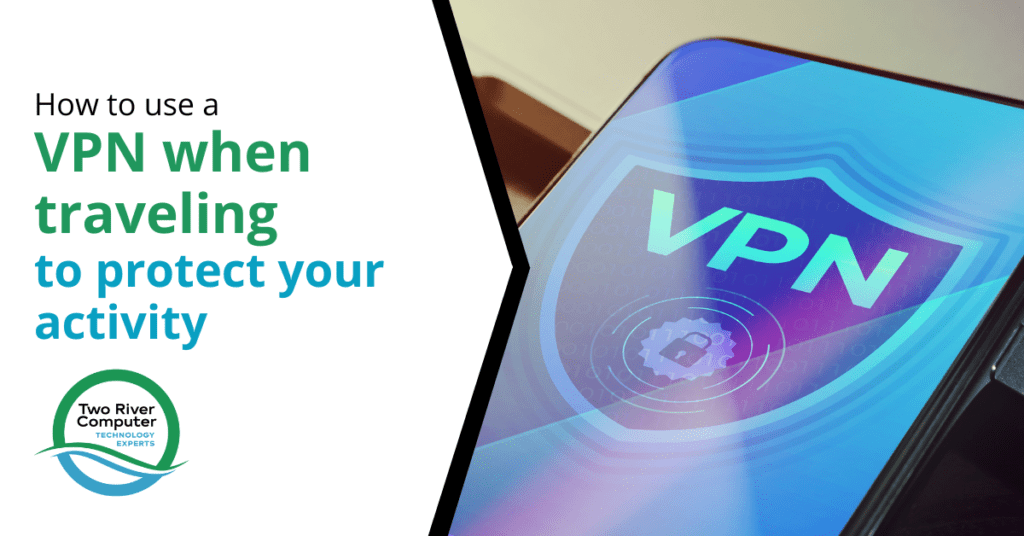
A virtual private network (VPN) is a service that encrypts your internet connection, hiding your IP address and location. Online security is of utmost importance these days, especially when traveling.
When you connect to the internet through a VPN, your online activity is shielded from prying eyes, including hackers, governments, and even your internet service provider (ISP). This is especially important when you’re using public Wi-Fi networks, which are playgrounds for hackers. In this article, we’ll explain how a VPN works, how to choose a VPN, and how to use one effectively when traveling to protect your activity.
How Does a VPN Work?
A VPN creates a secure and encrypted connection between your device and a server. This connection is called a “tunnel.”
All of your online activity, including browsing, streaming, and downloading, passes through this tunnel, making it difficult for anyone to intercept and read your data. The encryption used by a VPN service makes it nearly impossible for anyone to read your data, even if they do intercept it.
When you connect to the internet through a VPN, your device is assigned a new IP address. This makes it difficult for anyone to track your location or identify your device. This is an excellent tool to have when you’re traveling, as it can help you bypass geographical restrictions on certain websites and services.
To summarize, this is how a VPN works to protect your privacy:
- The VPN creates a secure and encrypted connection between your device and a remote server.
- You connect to the internet through the VPN and your data is sent through the secure connection.
- The VPN masks your real IP address, acting as an intermediary between you and any website you access.
When surfing the web, it will appear as if your connection is coming from a different location. This can help you bypass geo-restrictions and access content that is otherwise blocked when traveling to another state or country.
Many VPN services offer additional features such as kill switches, which disconnect you from the internet if the VPN connection drops. Split tunneling is another popular feature that allows you to choose which apps and websites use the VPN connection.
While it’s true that a VPN is a great tool for protecting your online privacy and security, it’s important to choose a reputable one. Not all VPN services are created equal, and some may not be as secure as they claim.
What Should You Look For In a VPN Service?
When choosing a VPN service, there are several factors to consider. The first is the encryption method used by the VPN.
You should generally look for a VPN service that uses military-grade encryption, such as AES-256. This is the strongest encryption available and will provide the best protection for your online activity.
Another important factor to consider is the location of the VPN’s servers. The more servers a VPN has, the more options you have for connecting to the internet.
With more server locations, there’s a higher probability for you to find a server close to your location. This can improve the speed of your connection significantly when browsing the internet and streaming.
It’s also important to review the VPN’s privacy policy. Make sure that the VPN doesn’t keep any logs of your online activity and that they have a strict no-logs policy. This will ensure that your online activity remains private and is not being recorded.
How To Use a VPN During Travel
When traveling, setting up and using a VPN on your mobile device or laptop can be a little more complex. However, most VPN services have user-friendly apps that make it easy to connect to a server from anywhere.
Be sure to set up your VPN before you leave home, so that you’re protected as soon as you connect to the internet.
It’s also a good idea to troubleshoot any potential issues before you depart. Make sure that your VPN is working properly and that you can connect to a server without any problems. If you do run into any issues while traveling, contact your VPN’s customer support for help.
While traveling, you may find that the VPN service you’re using is blocked. This can happen if you’re in a country with strict internet censorship laws. In these cases, you can try using a different VPN service or a different server location.
Take Advantage of VPN Protections
Using a VPN while traveling is an excellent method of protecting your online activity and personal information. It can help you bypass geographical restrictions, hide your location and IP address, and encrypt your internet connection.
In addition to just using one, it’s important to choose a reputable VPN service that uses military-grade encryption, has a wide range of server locations, and has a strict no-logs policy. If you set up your VPN before you leave home, you can troubleshoot any potential issues and be aware of potential blocked VPN services before you head out.
With these suggestions and best practices in mind, you can have peace of mind while using the internet abroad, knowing that your online activity and personal information are protected. At Two River Computer, we strive to educate our customers about online privacy and security.
Don’t hesitate to give us a call at (732) 747-0020 to learn how you can prioritize your data before your next vacation.


